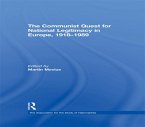Essay aus dem Jahr 2009 im Fachbereich Politik - Sonstige Themen zur Internationalen Politik, Note: 1,5, Universität Konstanz, Sprache: Deutsch, Abstract: This paper attempts to explain why in some post-communist countries, the old communist nomenklatura has successfully resisted, and in others did not. The collapse of the communist systems in Central and Eastern Europe did not necessarily mean the disappearance of the communist parties. Even if many collapsed, most of them attempted to adapt to the new political context. Some of the reformed communist parties successfully managed to adapt to the new political conditions, but others experienced serious problems in harmonizing the old coordinates of the party with the post-communist democratic requirements and expectations. How could the different paths of the communist parties in Central and Eastern Europe after 1989 be explained? Why some of these parties were capable to realize a relatively successfully transition to the new conditions of democratic struggle, while others were less able in doing so?
Dieser Download kann aus rechtlichen Gründen nur mit Rechnungsadresse in A, B, BG, CY, CZ, D, DK, EW, E, FIN, F, GR, HR, H, IRL, I, LT, L, LR, M, NL, PL, P, R, S, SLO, SK ausgeliefert werden.









